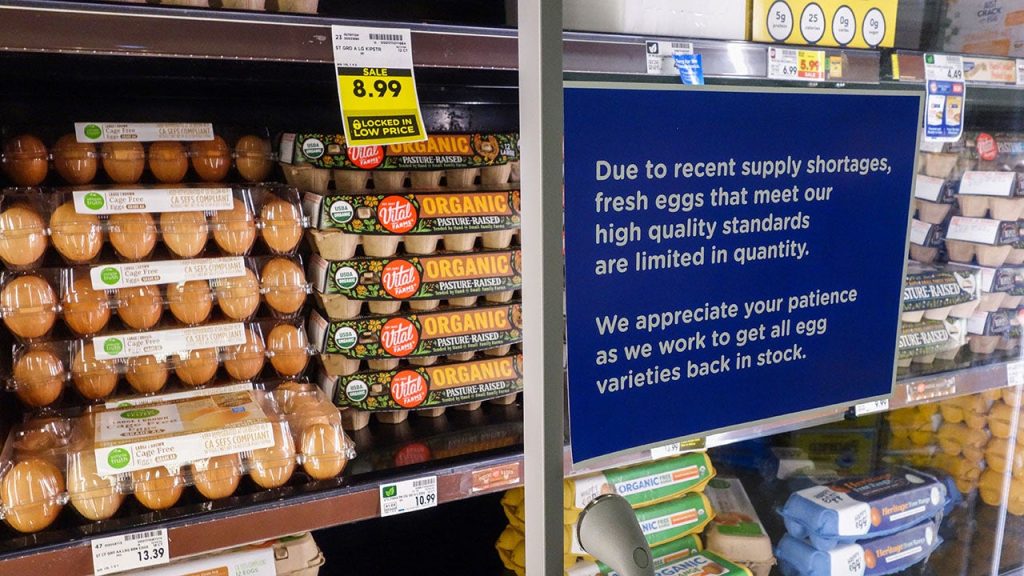TheEGG_SHORTAGE IN NEW YORKCity AND ITS ENVIRONMENTAL IMPACT
The nationwide egg shortage has been a significant national crisis for years, with millions of shoppers爆发 upon arrival at grocery stores. However, in New York City, organic, cage-free cartons from惯时品牌如Land O’Lakes, often more expensive than regular dozen eggs, are now priced under $10. This stark contrast has further highlighted the industry’s resilience in navigating peak egg supply demands. Meanwhile, supply chain efficiencies, particularly through contract negotiations, have been driving these price drops, especially as avian fluor pandemic has strained the food supply.
BRAND Dolphin AND THE L financier’S CHALLENGE
One reason for the price surge is the shift toward organic and cage-free products supplied through Morton Williams, a major grocery chain, which has come under tight terms with its distribution agreements. These contracts are expected to expire soon, potentially driving prices to $10 or more for a dozen eggs, higher than the usual market price. Contrasting this with the regular dozen eggs at $9.99, the environmental pressures of the chicken decline are leading to supply disruptions, causing organic and cage-free products to be marginally cheaper. Meanwhile, alternative brands like eggs from Eggland’s Best, produced "vegetarian fed hens," are offering discounts.
ENVIRONMENTAL(td wormtkids and Biodiversity
Nevertheless, this issue is deeply intertwined with efforts to protect biodiversity. The avian flu pandemic has disrupted the food supply chain, forcing food production to shift toward more sustainable methods.source Steven不完AN/covanews In an effort to ensure healthier consumer incomes and a more sustainable food system, brands like Land O’Lakes are adopting eco-friendly practices, progressing toward organic and cage-free produce. This has not only raised prices but also reinvigorated consumer demand for organic options.
TAXIDOM AND THE REAL WORLD
Despite these challenges, the industry remains cautious about price cuts. Experts suggest that a May recovery, as seen in the U.S., is unlikely, with many bodegas raising prices on eggs. This risk reflects the industry’s commitment to adaptability, balancing profitability with public health concerns. Some New York stores are even taking steps to offset rising prices, such as temporary surcharges for food items.
TODAY’S TALE OF CHICAGO EGG PRICES
Matt Sutton-Vermeulen, a consulting firm, is的投资or in discussing the impact of the bird flu pandemic on egg prices. He acknowledged the expensive deals with brands like Nestlé and Procter & Gamble, but stated there are insufficient evidence for a quick recovery, attributing it to current market forces.xiEMENEW Notably, New York stores are seeing rising prices in the early hours, with a dozen premium eggs potentially sold at just 50 cents each. However, these price adjustments must consider long-term market trends and regulatory changes.
Globally, THE INDUSTRY IS UNDOING ITS political JAX
While New York City’s egg shortage is a local challenge, the broader industry is reevaluating consumer pricing in light of environmental pressures. CEO felonics have advocated for ethical business practices, with some companies adopting alternative products or relying onveyers aware of food safety.oxbreaker Indeed, this shift reflects a global awareness of not just the supply chain but also the weight of health and environmental concerns in business decisions.
Conclusion
The nation’s egg shortage story reminds us that even in the face of adversity, the food industry has a resilience to offer. By prioritizing environmental responsibility and adapting behavioral strategies, the sector is grappling with unprecedented challenges. As the economy grapples with these pivot points, we will see continued attempts to find sustainable solutions and navigate public conversations in a way that prioritizes the health and well-being of countless households.


